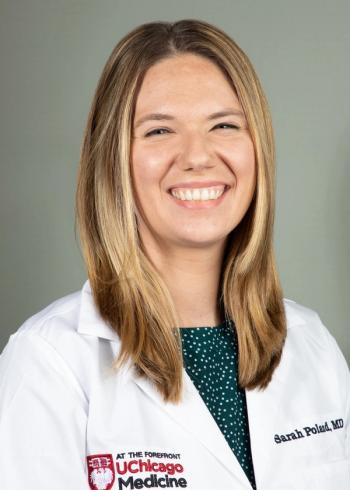
- ONCOLOGY Nurse Edition Vol 23 No 11
- Volume 23
- Issue 11
Preserving Fertility inYoung Women DiagnosedWith Breast Cancer
In the US, breast cancer is the most common invasive cancer in women, with more than 200,000 diagnosed with the disease each year.
In the US, breast cancer is the most common invasive cancer in women, with more than 200,000 diagnosed with the disease each year.[1] Approximately 25% of these women will be diagnosed before they experience menopause.[2] Because childbearing often is delayed until later in life, many premenopausal young women with breast cancer may not have started to have children or completed their families.
Improved public awareness, routine diagnostic testing with mammography, and medical advances in treatment have greatly increased the chances of long-term survival following a diagnosis of breast cancer. The life-saving treatment of breast cancer often profoundly affects fertility, leaving many women unable to fulfill childbearing goals.[3,4] For all women, breast cancer is a crisis; for young women desiring children, the combined threat to life and fertility is likely catastrophic.
Infertility following treatment is related to gonadotoxic chemotherapeutic agents and/or the length of time required to complete treatment.[5] Age at diagnosis is a major factor, as fertility naturally declines with age; women in their later childbearing years are at an increased risk for ovarian failure and permanent infertility.[3] Ovarian function following treatment is also related to ovarian function at the time treatment began and the specific chemotherapeutic agents prescribed (eg, see Table 1).[6,7]
The ideal time for fertility preservation is prior to treatment with chemotherapeutic or hormonal agents, meaning very soon after diagnosis. Yet many women diagnosed with breast cancer report not receiving information about the effect of treatment on fertility or on fertility preservation.[8–12] Most women diagnosed with breast cancer want comprehensive information about fertility preservation and want to retain the ability to have children.[8] The following case studies illustrate fertility-related concerns and issues facing young women with breast cancer.
Case Study 1
“Britney S.” is a 28-year-old single woman recently diagnosed with stage IIa breast cancer. Several weeks ago while showering, she found a lump in her left breast and went to her gynecologic provider for evaluation. A mammogram indicated a suspicious lesion in the left upper outer quadrant of her breast; a breast biopsy confirmed the lesion was cancerous. She is attending her initial appointment at a comprehensive breast health clinic to discuss treatment options with oncology healthcare providers.
Her health history indicates no prior significant health problems, and she has had no prior pregnancies. She has a positive family history of maternal breast cancer. Her social history reveals that she has recently accepted a new job as a financial analyst; her boyfriend has accompanied her to this initial visit and appears supportive. Visibly upset over the discussion of treatment options and long-term side effects, she is crying and states she has always planned to “get married at some point” and have a family.
Case Study 2
“Rebecca J.” is a 36-year-old woman who has transferred to her current healthcare provider from a clinic in another state. Diagnosed with stage II infiltrating ductal carcinoma of the right breast at 31 years of age, her records indicate that she has had breast-conserving surgery followed with 5 weeks of radiation therapy. She received four cycles of anthracycline-based combination chemotherapy every 3 weeks. She is hormone receptor–positive and is currently taking tamoxifen. She says that at the time of her diagnosis, she and her husband had just decided they were ready for children. She states that now that her treatment will soon be complete, she would like information about cancer and pregnancy, because she and her husband would like to start building a family as soon as her healthcare providers feel it is safe to do so. She has never been pregnant.
NURSING CARE
The patient described in the first case study, Britney M., will benefit from comprehensive education about her fertility-preservation options (
With IVF, a woman will receive hormone stimulation of her ovaries to produce multiple oocytes. Once mature, the oocytes can be retrieved and fertilized. The resulting embryos are then cryopreserved for use after treatment is completed. Women who do not have a partner to fertilize the oocytes and do not want to use donor sperm may choose to cryopreserve the oocytes; unfortunately, the chances of a successful pregnancy using cryopreserved oocytes is much lower than that from cryopreserved embryos.[13]
One ART option still in experimental stages is ovarian tissue cryopreservation and transplantation. This treatment entails removing ovarian tissue and cryopreserving it for later use. Once treatment is completed, the ovarian tissue is then xenotransplanted either orthotopically within the pelvis or heterotopically within subcutaneous tissue.[14–16]
Another highly debated treatment aimed at reducing chemotherapy induced infertility is the use of gonadotropin-releasing hormone agonists (GnRHa) during treatment to suppress ovarian function.[7] The effectiveness of this treatment is unknown. There also is some concern about potential interaction of GnRH agonists with adjuvant chemotherapy that could affect cancer treatment efficacy,[17] and about possible stimulation of occult tumor cells in hormone-sensitive breast cancer.[18]
The woman in the second case study, Rebecca J., has completed her treatment for breast cancer surgery, and it is probable that her fertility has greatly declined. It appears she was not provided with sufficient health information to understand that treatment for breast cancer can have a significant impact on fertility, and that fertility preservation is most effective if initiated prior to treatment with chemotherapeutic agents.
If appropriate given her overall health status, she should be referred to a reproductive endocrinologist to determine her ovarian function and possible treatment options. However, it will still be more than 1 year before completion of her hormone therapy with tamoxifen. In the event that conception of a biologic child is not possible, other treatment options such as donor oocytes or embryos may be a viable option. Adoption is also an option for women unable to conceive.
DISCUSSION
It is possible that some women fail to recall a discussion with their healthcare providers about treatment-related infertility and fertility preservation because they were overwhelmed by the diagnosis of cancer and the multitude of decisions that have to be made in a very short period of time. For this reason, nurses need to reinforce key points and ask questions to ensure understanding. It is also possible, however, that some women were not advised appropriately. In either case, the result is the same: unexpected infertility following treatment. Unfortunately, little can be done to restore lost fertility.
Nurses providing care for young women diagnosed with cancer or young cancer survivors completing treatment need to be aware of fertility-preservation options both before and after treatment, along with the advantages and disadvantages of each. Nurses also need to be knowledgeable about the availability of fertility-preservation options in terms of access, acceptability, and cost. For example, if providing care to a young woman with limited resources living in rural Montana, the nurse needs to be aware that the patient may not be financially positioned to seek an experimental treatment in California. The same holds true with IVF, as each IVF treatment cycle costs approximately $12,000 and is not covered by most health insurance plans. Further, personal or cultural beliefs may limit fertility-preservation options.
The lack of viable options for fertility preservation (or conception) can have major psychosocial and developmental consequences for these young women.[10,19] For this reason, nurses need to aware of signs of emotional distress in these patients, and provide appropriate support. Some women may need to be referred for counseling.
References:
References
1. Jemal A, Tiwari RC, Murray T, et al: Cancer statistics 2004.
CA Cancer J Clin
54(1):8â29, 2004.
2. Hankey BF, Miller B, Curtis R, et al: Trends in breast cancer in younger women in contrast to older women.
J Natl Cancer Inst Monogr
16:7â14, 1994.
3. Maltaris T, Weigel M, Mueller A, et al: Cancer and fertility preservation: Fertility preservation in breast cancer patients.
Breast Cancer Res
10(2):206, 2008.
4. Hickey M, Peate M, Saunders CM, et al: Breast cancer in young women and its impact on reproductive function.
Hum Reprod Update
15(3):323â339, 2009.
5. Gadducci A, Cosio S, Genazzani AR: Ovarian function and childbearing issues in breast cancer survivors.
Gynecol Endocrinol
23(11):625â631, 2007.
6. Lee SJ, Schover LR, Partridge AH, et al: American Society of Clinical Oncology recommendations on fertility preservation in cancer patients.
J Clin Oncol
24(18): 2917â2931, 2006.
7. Sonmezer M, Oktay M: Fertility preservation in young women undergoing breast cancer therapy.
Oncologist
11(5):422â434, 2006.
8. Partridge AH, Gelber S, Peppercorn J, et al: Web-based survey of fertility issues in young women with breast cancer.
J Clin Oncol
22(20):4174â4183, 2004.
9. Thewes B, Meiser B, Taylor A, et al: Fertility- and menopause-related
information needs of younger women with a diagnosis of early breast cancer.
J Clin Oncol
23(22):5155â5165, 2005.
10. Canada AL, Schover LR: Research promoting better patient education on reproductive health after cancer.
J Natl Cancer Inst Monogr
34:98â100, 2005.
11. Avis NE, Crawford S, Manuel J: Psychosocial problems among younger women with breast cancer.
Psychooncology
13(5):295â308, 2004.
12. Duffy CM, Allen SM, Clark MA: Discussions regarding reproductive health for young women with breast cancer undergoing chemotherapy.
J Clin Oncol
23(4):766â773, 2005.
13. Dunn L, Fox KR: Techniques for fertility preservation in patients with breast cancer.
Curr Opin Obstet Gynecol
21(1):68â73, 2009.
14. Oktay K, Karlikaya G: Ovarian function after transplantation of frozen, banked autologous ovarian tissue.
N Engl J Med
342(25):1919, 2000.
15. Oktay K, Buyuk E, Rosenwaks Z, et al: A technique for transplantation of ovarian cortical strips to the forearm.
Fertil Steril
80(1):193â198, 2003.
16. Oktay K, Economos K, Kan M, et al: Endocrine function and oocyte retrieval after autologous transplantation of ovarian cortical strips to the forearm.
JAMA
286(12):1490â1493, 2001.
17. Cruz MR, Prestes JC, Gimenes DL, et al: Fertility preservation in women with breast cancer undergoing adjuvant chemotherapy: A systematic review. Fertil Steril March 30 2009; Epub ahead of print.
18. Gerber D, Dieterich M, Muller H, et al: Controversies in preservation of ovary function and fertility in patients with breast cancer.
Breast Cancer Res Treat
108(1):1â7, 2008.
19. Schover LR: Psychosocial aspects of infertility and decisions about reproduction in young cancer survivors: A review.
Med Pediatr Oncol
33(1):53â59, 1999.
Articles in this issue
over 16 years ago
Young Adult Survivors Face Unique Challengesover 16 years ago
Challenges of IP Chemotherapy for Ovarian Cancerover 16 years ago
Treatment of Ovarian Cancer With Intraperitoneal Chemotherapyover 16 years ago
KRAS Data Prompt Cetuximab, Panitumumab Product Label Changesover 16 years ago
The Emerging Discipline of Integrative Oncologyover 16 years ago
Vitamin Dover 16 years ago
Hypothyroidism:A Growing Complicationof Cancer Treatmentover 16 years ago
Our Fall Focus on WomenNewsletter
Stay up to date on recent advances in the multidisciplinary approach to cancer.
Related Content




Molecular Interception: Discussing the Future of Surgery in Breast Cancer



















































